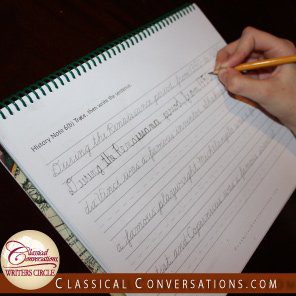Although copywork, dictation, and narration are not difficult concepts, I struggled with how to implement them effectively during our first years of homeschooling. I offer here what I have learned about these valuable tools of learning—not as an expert, but as a beginner who is still learning how to best implement a classical education in our home.
What is copywork? Copywork is the act of writing down, word for word, a sentence or passage from another source. The goals are excellent penmanship, accurate punctuation and capitalization, and a discussion of sentence structure and English grammar as appropriate for the child’s learning level.
Anything can be used as a source text for copywork. We have used Scriptures, storybooks, the Acts & Facts Science Cards, and Prescripts by Classical Conversations. For a detailed description of each level of the Prescripts cursive writing program, click here.
 What is dictation? Dictation is the act of writing words or sentences that are stated out loud by another person.
What is dictation? Dictation is the act of writing words or sentences that are stated out loud by another person.
Here is an example of how to use dictation for the first part of Psalm 119:9:
Teacher says:How can a young man keep his way pure?
Student repeats: How can a young man keep his way pure?
Teacher says: Write How can a young man keep his way pure?
Student writes: How can a young man keep his way pure?
Teacher reminds student: Is there anything special you need to remember in this sentence? (e.g., special punctuation or capitalization)
Student self-checks work.
Teacher spells the entire sentence out loud, including punctuation, so that the child can check his work and make corrections.
Teacher says: Check and correct your sentence: How, capital H-o-w, can, c-a-n, a, a, young, y-o-u-n-g, man, m-a-n, keep, k-e-e-p, his, h-i-s, way, w-a-y, pure, p-u-r-e, question mark.
It is best to select sentences that contain spelling words previously tested as a review. You may also want to select only one sentence structure or punctuation concept at a time and move on to another after that concept is mastered completely (e.g., focus on end marks one week, addressing one type of sentence at a time; move on to commas after interjections, and so on).
What is narration? An oral or written narration is the act of telling back something that the reader read or something that was read to him/her.
Narration can be tough! It requires excellent listening skills. For younger students or beginners, start by reading one or two sentences from a book. The child does not recite the sentences word-for-word; instead, the child summarizes the major concepts including any necessary details. If the student has trouble with this, ask questions to prompt him, or allow another child to add what he remembers. Eventually, your child will progress from narrating sentences, to narrating a paragraph, a page, a chapter, and finally, an entire book. When children get to this point, their narration should include the main characters, setting, conflict, plot, climax, resolution, and theme.
Ideas for creative narration:
- Sing the narration.
- Let them dress up to narrate the life of a person… such a King Solomon.
- Put on a puppet show detailing a story from history.
- Allow the child to “teach” the class at the whiteboard by drawing simple pictures as he narrates.
- For written narration, you can use lap booking templates, as shown in this linked article.
- Let your child write his own version of a book.
- Draw a comic strip to illustrate the narration.
- Involve Dad at the dinner table. Ask your children to tell about something they are reading.
- Videotape your child’s narration and watch it together as a family. (Videotaping may be used for older children to hone their presentation skills by critiquing themselves.)
Possible resources to use for copywork, dictation, and narration:
- Bible verses or Bible stories
- The memory work in the Foundations Guide
- Classical Acts & Facts History Cards
- Classical Acts & Facts Science Cards
- Storybooks, fairytales, or fables
- Story of the World or other read-aloud books
- Comic books
- Encyclopedias or other non-fiction resources
- Newspaper or magazine articles (LEGO magazine?)
- Let them choose something they enjoy!
Why use copywork, narration, and dictation? By simply opening a book and beginning with the process of copywork, dictation, and narration, I finally realized the value in using these inexpensive tools of learning, which are training our children to:
- Listen and pay attention to details
- Imitate the “masters” of poetry, writing, and storytelling
- Improve their penmanship while increasing writing speed and accuracy
- Learn and apply rules for spelling, punctuation, capitalization, sentence structure, and parts of speech (If used consistently in this manner, copywork and dictation can equip Classical Conversations families for the Essentials program.)
Once again, I am thankful for the freedom I have found in the simplicity of the grammar stage.




